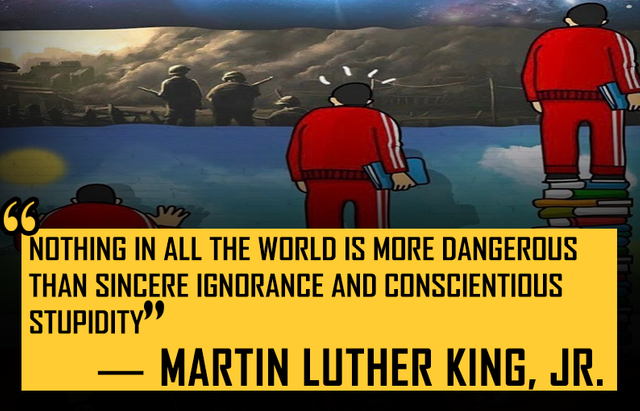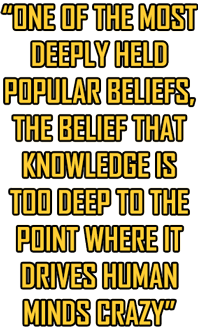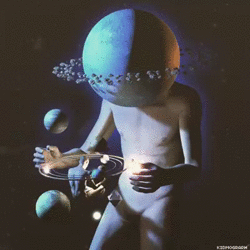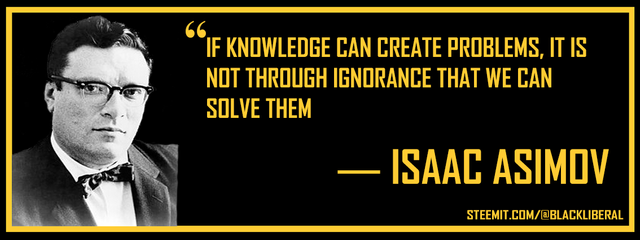It seems incredible the information disparity that can exist between two people who share time and space, who apparently under the same socioeconomic and political circumstances have data on reality that is totally dissimilar and even contradictory to each other.

This is certainly a case of universal facts like absolute truth, love, and happiness. They require an odontological and anthropological study of the human being to find a rational response to these variables that are not at the mercy of the human being. It is often said that ignorance is the key to happiness, that is, that a state of ignorance about the macro-environment and the social problems that surround us can function as a defensive barrier against unhappiness, as it plunges us into a state of unconsciousness in which we perceive reality as a simple fiction, something like a kind of Quixote indifferent to the world. But to what extent is this true?

Kant considered the "rational man" - the one who is wise - to be a being immersed in worry and jealous of the one who enjoys happiness in a common way, inaccessible to the one who has reached high levels of universal understanding and rational development. Therefore, Kant argued that the idealization of happiness can only be achieved by a man who does not know all these concepts. Kant argues that the existential anguish or crisis of belief that usually affects a man of "cultivated reason" does not greatly affect the psyche of the ignorant but asserts that the common man replaces this "intellectual" suffering with other no less painful sufferings: superfluous desire, pride, frustration. A pain that is significantly less intense than that suffered by the intellectual.
Obviously, the German author is inclined in his analysis not only by his own life experience but, above all, by a tradition that starts at least from Ecclesiastes (1:18) and which tells us that "whoever adds science adds pain". This pessimistic idea, according to which the development of our rational abilities increases our concrete vital dissatisfaction, was taken up again by Schopenhauer and, through him, has profoundly influenced currents of thought such as existentialism during the 20th century.
In front of this mentality that disassociates reason from pleasure and happiness, authors such as Plato, Aristotle or Spinoza stand up. They value reason not only as a speculative tool but also, and above all, as an instrument that allows a man to adapt to the social environment and be happy. The development of its own being is the end of everything: the tree seeks to grow as the lion seeks its prey, in this approach to its specific ends expand its being. In man this development of being is called "happiness", and since reason is the quality proper to the human being, this happiness will be optimally achieved by the one who develops and exercises his reason. The rational man is a wise man and the wise man lives happily. Which virtue or knowledge is it that makes us bitter and darkens the spirit? A false or useless science or both at the same time.


Source
Two forces that do not oppose each other are, broadly speaking, part of the same phenomenon. For human consciousness there is no being on the earthly plane who knows everything or who ignores everything, but there are happy people and unhappy people.
The idea that knowledge is related to unhappiness is one of the most deeply rooted beliefs in our society, which understands that the greater our wealth of knowledge, the greater our vital dissatisfaction will be. It is an idea that is not modern and transcendental in the history of humanity and is more present today than ever before. To be more concise, our society has the idea that ignorance is a blessing that provides happiness. The image of the genius who knows everything and lives tormented by his knowledge and his own mind is quite common in the entertainment world in the Western Hemisphere.

One of the most deeply held popular beliefs, the belief that knowledge is too deep to the point where it drives human minds crazy. An example of this is Lovecraft's work or the erroneous legend about George Cantor, who is said to have gone mad after an existential crisis because of his great advances in the subject of infinity. According to this postmodernist thinking, one could get the idea that, in fact, knowledge could destroy the mind the deeper and more complicated it is.
Stephen Hawking, probably the most intelligent man of the entire 21st century, a celebrity but also a figure of theoretical physics, has suffered most of his life from a mute disease called amyotrophic lateral sclerosis, which has put him in a wheelchair for most of his lifetime and paralyzed him almost completely. Despite the fact that this man is suffering, his intelligence and knowledge are not open to debate or questioning. Hawkings has lived and worked continuously and non-stop throughout his life, not perfectly and not brightly as a whole but not in a depressed state with an attitude of suffering due to his physical limitations.

Source
The subject goes beyond what it really is and is more complex than a series of exaggerated comments about popular culture, let's be honest, ignorance is not a blessing, much less a synonym for virtue, in fact, it is an element that rots everything it touches excessively. It is amazing that this species that owes everything to its capacity to know and generate knowledge says that this is less of what it really is, a blessing. Knowledge is power no matter how cliche it may sound, it offers possibilities and at the same time works as a bridge to obtain more knowledge.
However, it is not gradual in a conventional way, not because you have a degree in letters, you are a graduate in all other fields. Human beings will always have dark gaps in their understanding of the world, not for nothing did Socrates say

Often used by the same apologists for ignorance to praise ignorance and to claim it, but no, Socrates never referred to ignorance, much less to raise it. With this phrase Socrates refers to the universality of knowledge and how impossible it is for human beings to achieve this universal knowledge.
It is these very gaps in knowledge that can hide a nefarious weakness that can bring down all happiness. A clear example could be a psychologist who, although his or her studies and close contact with many people suffering from depression or problems, does not necessarily see himself or herself as an outsider that cannot suffer from the the same problems. Even a depression may take he or she by surprise if he or she is confident or blinded by the idea that his or her knowledge makes he or she immune to any kind of damage or depression.
The key to not being blinded by knowledge in our own pride is to start from the knowledge of our own human condition. Computer security experts know that they have to start from the idea that the most prepared can be prone to deception no matter how broad their knowledge and intelligence is because every human being tends to comfort following behavior patterns. As far as a person knows a lot, it does not make him or her unhappy because that does not necessarily mean that he or she knows how to deal with the innumerable sources of unhappiness that exist in the universality of the world, sometimes not even knows exactly what makes him or her happy.

On the other hand, some knowledge is extremely painful, mainly because of the inherent egocentrism of human beings, who are unable to conceive of even such a large and perfect world as ours, overestimate its current importance in existence, meaning, they are anthropocentric and believe that the eschatology of life is that the world exists to serve them and rounds around them. When this egocentricity collides with the vision of an unimaginably large, immense and sidereal universe, the ego is deeply wounded. There one either comes to the acceptance and creation of a broader vision of reality to accept the universality of the world or one submits to the pain of not being what one desires, of an existential contradiction, in other words, it is the incomplete visions or those that do not take into account the humanity of the observer that fall into very painful contradictions and conflicts.


The problem is not as simple as recognizing the importance of the human being so I start from it to reach any knowledge. Because of the existence of Faustian knowledge, knowledge of understanding and an abysmally inhuman nature, the breadth of the universe, relativity, the historical vision of culture, the lack of all kinds of ethics and morals in the natural world, among other subjects that are beyond human comprehension. This kind of knowledge requires more than understanding. These require a radical change in paradigms on the part of entire societies that take into account the finite, animal and abstract character of the human being. This is by no means simple and does not mean that things will end well - why does the whole society have to change? Because we are gregarious beings and the truth requires an agreement for us to think of it as truth.
Every human group, however passive it may be, places limits on all those who do not share their worldviews and perspectives of truth. If a person succeeds in understanding Faustian knowledge in a society that does not understand it, his life will be in danger and everything in it will change. It risks being rejected and destroyed by society. Whoever will see him as a lunatic and a vehement, this can also happen to someone deeply ignorant whose ideas are completely wrong, so wrong that they generate a complete rejection of society.
It is important to recognize that some knowledge requires a diplomatic attitude towards the world, thinking that differences in knowledge between just two people can cause severe misunderstandings. Ignoring this can lead to loneliness and then unhappiness. A person with a lot of knowledge but with communication problems may end up thinking that their knowledge is a curse.

Source
What about the human knowledge that we often refer to with songs and poems with extremely painful memories? does this knowledge make us extremely unhappy? Both yes and no. Clearly traumatic events and broken hearts are a source of pain that can severely hurt us, but they are also part of a whole person.
Many works have already raised the importance of acceptance in the face of many ailments and emotional problems, this ignoring and forgetting things like failed relationships is simply a search for escape and not acceptance, from the escape of feelings arise internal contradictions that could have worse repercussions than pain and sadness, things like the complex, irrational fears and anxiety.
What must be understood, therefore, is that pain is part of life if we possess the ability to erase painful memories at will, logic would indicate that we would lose the ability to assimilate pain because how could you contrast pain to say that it is necessary? Or necessary if you don't remember the pains of decisive moments?

To understand why some people prefer to be negligent and indifferent to certain problems that challenge their happiness, a psychological study published in the Journal of Personality and Social Psychology of the American Psychological Association offers an answer through research into the psychological implications of that happiness that some (or many) find in ignorance, especially when it comes to social problems that somehow confront their personal comfort.
Steven Shepherd was in charge of the research at the University of Waterloo in Ontario, where he conducted a series of 5 experiments with 511 adult volunteers in both the United States and Canada, in what is described as "a chain reaction of ignorance of an issue to government dependence and trust in its handling of the issue.
In the first experiment, participants who were most affected by the economic crisis of 2008 were brought together, the author found that at the same time participants were trying to avoid information that questioned the government's ability to manage the economy, but not positive information about it. These people were provided with complex information about the functioning of the economy and tried to clarify their doubts about the issue, mainly because these issues directly affected them.

Source
The participants who received this kind of intensive course developed a certain helplessness in the face of economic issues and, as a consequence of this, a greater trust and dependence on the government and its actions in the economic sphere, as well as a lesser desire to learn more about these issues.
One of the researchers involved in the study, Aaron C. Kay of Duke University, is said to be surprised that many would rather turn a blind eye to the issue than leave everything, as in this case, in the hands of government authority. "In the end, they avoided learning about it because it could break their faith in government," he said.
In the rest of the studies, more or less in the same vein, the type of information offered to the participants was also played with, sometimes simpler information and sometimes equally specialised, which would end up having a similar effect: people with complex data on a subject choose to place their trust in the government more than those with simple information.
The research is certainly not conclusive, but it certainly gives an idea of the attitude that many people take to issues that, for some reason, somewhat challenge their personal stability. The response to expert information, however, is somewhat surprising, as it is perhaps to be expected that more information on an issue will arouse more curiosity about it and even a certain degree of commitment. But, at least in these tests, the exact opposite is true, starting from the helplessness that some people experience in the face of what they do not understand.

From this study it could be concluded that people ignore social problems not because they are ignorant, but because they are indifferent so that it does not affect their emotional state. They prefer to trust other people with regard to this type of issue in order not to alter their emotional state. We are human beings and we have limits, it is wise to counteract negative knowledge with positive knowledge. Not falling into the trap of optimism and not falling into the trap of pessimism as well as taking breaks when faced with large amounts of information whether positive or negative is relevant to healthy emotional stability.
To end ignorance does not make us happy it makes us vulnerable, therefore beings whose happiness is more fragile. In themselves people who long for ignorance to be happy long for indifference seek to be able to justify their indifference so as not to deal physically or mentally with the problems they face. It is normal but not healthy to want to be indifferent in a society that calls them to a sickly collectivism, an attitude obsessed with comfort and immediate stimuli. Indifference is necessary to a certain extent. We can't take care of everything, because we'd go crazy. However, an excess of it puts us in the same situation of the ignorant, at the mercy of the environment and our own mistakes. In short, excessive ignorance leads people to the most foolish and mediocre hoodlums.



Thanks for reading!
© 2001 - 2017 All rights reserved. steemit.com/@blackliberal | Terms & Conditions of Use | Privacy Policy



Curated for #informationwar (by @openparadigm)

Relevance: Ignorance is Bliss, Knowledge is Power
Our Purpose
Downvoting a post can decrease pending rewards and make it less visible. Common reasons:
Submit
Hi blackliberal,
LEARN MORE: Join Curie on Discord chat and check the pinned notes (pushpin icon, upper right) for Curie Whitepaper, FAQ and most recent guidelines.
Downvoting a post can decrease pending rewards and make it less visible. Common reasons:
Submit
Thanks for your guys support!
Downvoting a post can decrease pending rewards and make it less visible. Common reasons:
Submit
Upvoted from the whaleshares show :)
Downvoting a post can decrease pending rewards and make it less visible. Common reasons:
Submit
Always quality work !!!
Downvoting a post can decrease pending rewards and make it less visible. Common reasons:
Submit
This post was shared in the Curation Collective Discord community for curators, and upvoted and resteemed by the @c-squared community account after manual review.
Downvoting a post can decrease pending rewards and make it less visible. Common reasons:
Submit
Best community! Glad to be part of it!
Downvoting a post can decrease pending rewards and make it less visible. Common reasons:
Submit
Congratulations @blackliberal! You have completed some achievement on Steemit and have been rewarded with new badge(s) :
Click on the badge to view your Board of Honor.
If you no longer want to receive notifications, reply to this comment with the word
STOPTo support your work, I also upvoted your post!
Do not miss the last post from @steemitboard!
Participate in the SteemitBoard World Cup Contest!
Collect World Cup badges and win free SBD
Support the Gold Sponsors of the contest: @good-karma and @lukestokes
Downvoting a post can decrease pending rewards and make it less visible. Common reasons:
Submit
Great reading! Thank you, @blackliberal!
Downvoting a post can decrease pending rewards and make it less visible. Common reasons:
Submit
Thank you! Hope you enjoyed it.
Downvoting a post can decrease pending rewards and make it less visible. Common reasons:
Submit
You're welcome! Yes, I really did :)
Downvoting a post can decrease pending rewards and make it less visible. Common reasons:
Submit
I love your post and the theme about your write. I think that the persons use the inteligence and racionality for make cash and power, and this is bad for the others parte of world. I think that the racionality is used to opression and generate inequality in this sistema. Big Hug partner.
MissJoss
Downvoting a post can decrease pending rewards and make it less visible. Common reasons:
Submit
Congratulations! This post has been upvoted from the communal account, @minnowsupport, by BlackLibertario💡 from the Minnow Support Project. It's a witness project run by aggroed, ausbitbank, teamsteem, theprophet0, someguy123, neoxian, followbtcnews, and netuoso. The goal is to help Steemit grow by supporting Minnows. Please find us at the Peace, Abundance, and Liberty Network (PALnet) Discord Channel. It's a completely public and open space to all members of the Steemit community who voluntarily choose to be there.
If you would like to delegate to the Minnow Support Project you can do so by clicking on the following links: 50SP, 100SP, 250SP, 500SP, 1000SP, 5000SP.
Be sure to leave at least 50SP undelegated on your account.
Downvoting a post can decrease pending rewards and make it less visible. Common reasons:
Submit